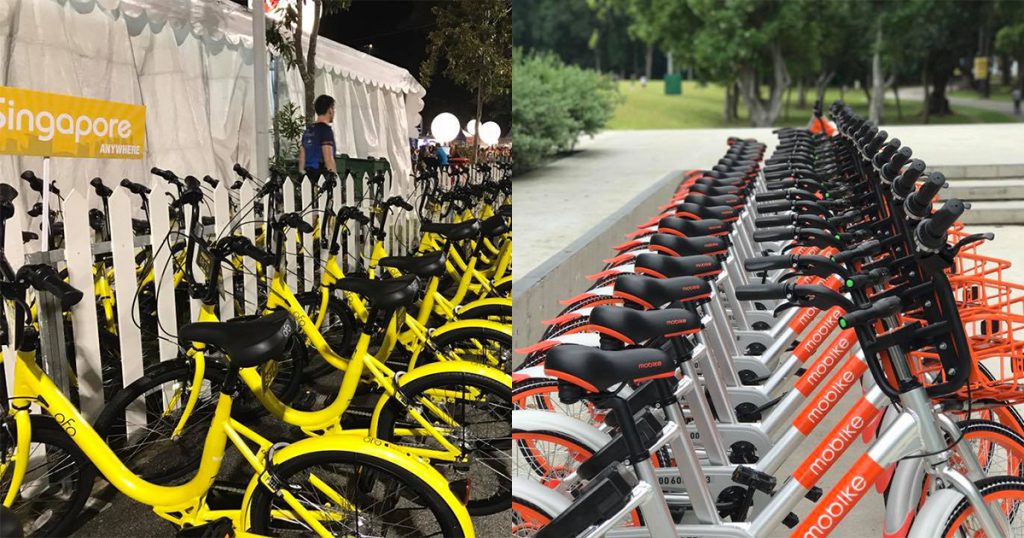Bike-sharing is officially in full cycle right here in Singapore.
As the government gears into alternative transportation methods to create a car-lite Singapore, bike-sharing is turning out to be viable means for people to get home from MRT stations and other high traffic transportation nodes.
ofo, Mobike, And oBike

3 companies are currently leading the race in turning Singapore into a bicycle friendly country and they are ofo, Mobike, and oBike.
If you take the MRT regularly, you will undoubtedly have seen several yellow or orange bicycles being parked at the racks or designated spots around the station.
ofo and Mobike both originated in China and have gained significant traction since their founding as an “Uber for bicycles”. ofo dominates northern China, while Mobike is taking over the south.
oBike is the only homegrown startup out of the three, having first appeared alongside ofo in beta before officially launching its services last week through a partnership with Tampines Town Council.
ofo, The US$2 Billion Bike-Sharing Company

We’ve already covered Mobike and oBike previously, so here’s a crash course on ofo.
ofo is currently worth an estimated more than US$2 billion, and is backed by a firm which has previously invested in another Chinese giant, Didi Chuxing, and the company even welcomed Apple CEO Tim Cook for a visit recently.

Out of the three companies, the founder of ofo is also the youngest.
Currently 25-years-old, Dai Wei left his PhD course in Peking University with four other students in a bid to find a solution for students to get around campus more efficiently.
The name ofo was also chosen simply because the letters put together looked like a bicycle. ofo is also in London aside from China and Singapore, and they have plans to expand to an additional 20 countries by the end of the year.
Same Same But Different?

If bike design is important to you, know that ofo bikes do not feature a basket for putting your stuff while Mobike and oBike have one.
Also, aside from obvious colour differences, they function as a bicycle should, with slight hardware differences. When booking each of them, they more or less work the same way too.
First, you need to download their individual apps and create an account, then pick a nearby bike of your choosing, scan a special code to unlock it, and off you go.
Payment for all three is via credit/debit cards through the app. This partially helps to limit the age range of users somewhat (unless there are kids with their parents’ credit cards).
Availability of the bikes from each company largely depends on which part of Singapore you are located at. The common place among them though has been mentioned countless times – the bike racks of MRT stations.
Otherwise, these bikes can more less be found near where they are originally located. Only for oBike does users have to park at their designated sites. ofo and Mobike state that users can park the bikes at any public bicycle parking areas such as those at MRT stations and HDB void decks.
Then There Are The Problems
Since its launch earlier this year, bike-sharing has been making the headlines on local news for all the right, and wrong reasons.
Sure, many are applauding the companies stepping in to give an alternate choice for commuters to travel to and from their home and workplaces to major MRT stations.
Having a sharing economy model means that the responsibility falls both on the company and users of the service. Unfortunately, the latter seems to be the bigger problem.
Reports of bikes being parked inappropriately outside of designated zones are sadly the minor problems.
Common sightings of severely damaged bikes and bikes being thrown into canals have escalated, leading many to count down the days when these bike-sharing companies eventually pull out of Singapore.

The problem is even more pronounced with ofo. This is because unlike competitors oBike and Mobike, ofo bikes do not feature GPS chips in the bikes themselves.
Instead, the ofo bikes are reliant on the GPS within the phones of users after using the app to unlock it.
For local startup oBike, after going through their initial beta period, they have introduced stiff penalties at launch. Read about it in detail in our previous coverage here.
Mobike too has its own credits system that rewards good behaviour, and penalises irresponsible ones.
Can We Really Have Nice Things?

With all the negative news plaguing the headlines with the misuse of the bikes, many are questioning the readiness of Singaporeans in accepting such sharing infrastructures.
While they may often be referred to as the “Uber for bicycles”, unlike Uber, these companies actually have inventory – the bicycles.
Finances have to be set aside for not just more bicycles, they will also require a team of maintenance personnel.
Profit margins for the bike-sharing services are also very low, given that rides are charged basically in the cents, and so the profitability of these business will have to be dependent on volume.
This means having more bikes, for more riders, while taking into account errant riders who damage and misplace bikes.
Even for local company oBike, they are concentrating in the promotion of a good cycling culture, even before profits come into the picture.
Can we really have nice things? Time will tell.











